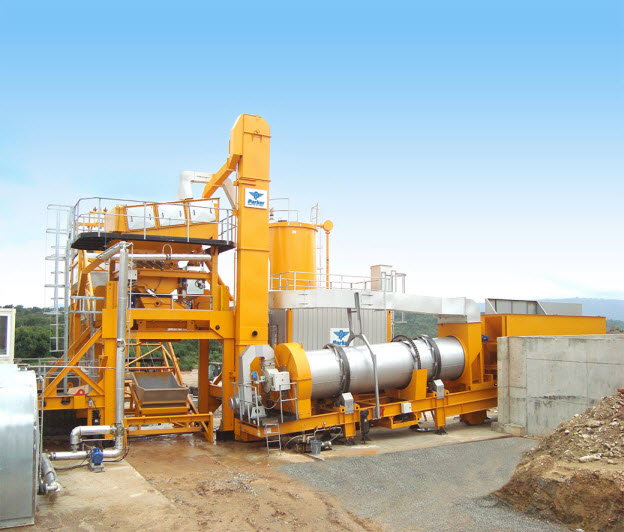Asphalt batching plants are fundamental to the construction industry, providing the essential material needed for paving roads, parking lots, and various infrastructures. Understanding the capabilities and features of different types of asphalt plants is crucial for maximizing efficiency and meeting project demands effectively. Modular and mobile asphalt batching plants cater to different scenarios, offering tailored solutions that leverage their unique strengths to overcome the diverse challenges of modern construction environments.
What is a Modular Asphalt Batch Plant?
A Modular Asphalt Plant is designed for permanent installation, offering high production capacities to meet the needs of large-scale projects. These plants consist of various components such as mixers, heaters, and dryers, which are assembled on-site in a modular fashion. This configuration allows for easier upgrades and maintenance, providing a long-term solution for producing high volumes of quality asphalt with precise mixture specifications.
Advantages of Modular Asphalt Batch Plants
Modular asphalt batch plants are celebrated for their scalability and high capacity, making them ideal for extensive construction projects that require a consistent supply of asphalt. Their modular design allows for expansion or technological upgrades without complete disassembly, making them highly adaptable to evolving construction needs. Additionally, these plants often incorporate advanced environmental controls that minimize emissions and allow for the incorporation of recycled materials, thereby supporting sustainable construction practices.
Challenges Associated with Modular Asphalt Batch Plants
The primary challenges of modular asphalt batch plants include their significant initial investment and the requirement for a fixed installation site. These factors can limit flexibility and increase upfront costs. Additionally, the installation process is complex and time-consuming, requiring detailed planning and skilled labor, which can delay the start of production and extend project timelines.
What is a Mobile Asphalt Batching Plant?
Mobile asphalt batching plants offer a compact and movable solution, ideal for temporary construction sites and smaller projects. These plants are built on trailers that can be towed to various locations, allowing for direct asphalt production on-site. This mobility reduces transportation costs and enables quick setup and dismantling, providing a flexible option for projects with varying locations or short durations.
Advantages of Mobile Asphalt Batching Plants
The most significant advantage of mobile asphalt batching plants is their mobility, enabling quick relocation from one project site to another without significant downtime. This is particularly beneficial for projects such as road repairs or small-scale construction that require asphalt at multiple, often remote, locations. Their design focuses on minimizing setup time, maximizing the time spent on actual production.

Challenges Associated with Mobile Asphalt Batching Plants
While mobile asphalt plants are advantageous for their portability, they face challenges such as lower production capacities compared to modular plants. This can be a limitation for large-scale projects that require a continuous, high volume of asphalt. Furthermore, frequent relocations can lead to increased wear and tear on the equipment, potentially leading to higher maintenance costs over time.
Comparative Analysis: Modular vs. Mobile Asphalt Batching Plants
Choosing between modular and mobile asphalt plants often depends on the project's scale and duration. Modular plants are suited for long-term projects with stable site locations due to their high production capacity and ability to produce consistent quality asphalt. In contrast, mobile plants offer practical solutions for projects requiring high flexibility and lower quantities of asphalt, accommodating the dynamic nature of certain construction projects.
Technological Innovations in Asphalt Batching
Recent technological innovations in asphalt batching plants focus on enhancing efficiency, reducing environmental impact, and integrating digital technologies. Modular plants are increasingly incorporating automated control systems that optimize the mixing process and reduce material waste. Similarly, mobile plants are seeing improvements in heat conservation and material handling technologies, which enhance their operational efficiency and environmental sustainability.
Environmental Impact and Sustainability
Modern asphalt batching plants are increasingly designed with sustainability in mind. Both modular and mobile plants are incorporating systems for dust collection, smoke filtration, and noise reduction to minimize their environmental footprint. Additionally, innovations in asphalt recycling within these plants allow for the reuse of old asphalt, significantly reducing waste and the need for new materials.
Choosing the Right Asphalt Batching Plant
Selecting the right asphalt batching plant involves analyzing project needs, including the duration, location, and environmental impact. Factors such as expected production volume, the frequency of relocation, and local environmental regulations play critical roles in this decision-making process. Consulting with industry experts and manufacturers can provide insights and recommendations tailored to specific project requirements.

Asphalt Batching Plant Maintenance and Safety Practices
Effective maintenance and robust safety practices are crucial for the longevity and safe operation of asphalt batching plants. Regular maintenance checks, adherence to manufacturer guidelines, and training for staff on safety protocols ensure that the plants operate efficiently and safely, preventing downtime and accidents.
Future Trends in Asphalt Batching Technology
The future of asphalt batching technology is likely to see further advances in automation, energy efficiency, and recycling capabilities. As the demand for more sustainable and cost-effective construction solutions grows, asphalt batching plants will continue to evolve, incorporating more sophisticated technologies that reduce environmental impact and enhance operational efficiency.
Conclusion
Understanding the specific features, benefits, and challenges of modular and mobile asphalt batching plants is crucial when selecting the right equipment for construction projects. Both types of plants offer distinct advantages that can greatly affect the efficiency and success of a project. By considering the specific needs and conditions of a project, constructors can choose the most suitable asphalt batching plant, ensuring optimal performance and sustainability.



